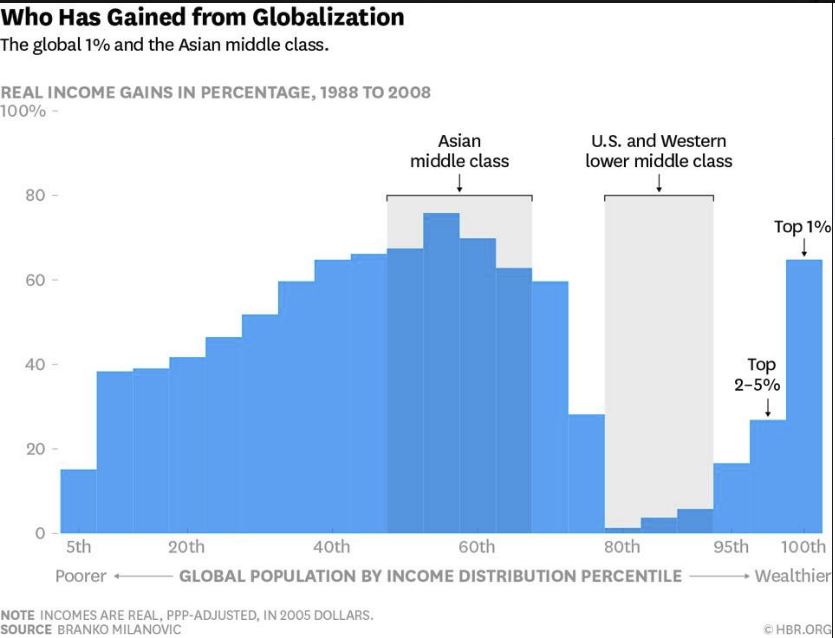 This is a look at the politics of the presidential campaigns that bombard us daily. It is a look at some of the implications of the current political environment for business leadership and communications. After November, the heated rhetoric of the campaign will come to an end. However, some of these fissures in society will remain and they will continue to impact the climate for business.
This is a look at the politics of the presidential campaigns that bombard us daily. It is a look at some of the implications of the current political environment for business leadership and communications. After November, the heated rhetoric of the campaign will come to an end. However, some of these fissures in society will remain and they will continue to impact the climate for business.
- Trust/Reputation: As we know, both candidates have issues on this front, rightly or wrongly. Some say it is a rarity for Americans to have to choose based on who you like least. The key implication here for business and communications is not your choice of candidates. It is that trust and reputation matter more than ever. Trust and reputation are fundamental to how free-markets operate. Trust and reputation underpins business growth and is critical for products. Trust and reputation will continue to matter after the election, perhaps impacting business more than ever. They will also impact how business moves forward on the issues arising out of this campaign (see below).
2 Transparency/Authenticity/Political Correctness: Related to trust and reputation are matters of authenticity, transparency and believability. Words matter, as we hear. Not only do words matter, but “weasel words” undermine authenticity. Transparency and values matter too. Words should be clear about both values and action. Words should not simply be politically correct or vague. Standing up for values has merit and gains attention. Talking points that are BS, increasingly, will be seen, and called out, as such.
3. American (Global?) Capitalism at a Crossroad? Both campaigns include elements of economic populism. They often call out business for “irresponsible” actions. For example, big banks caused the economic crisis we just came through; free trade doesn’t work; income inequality is rampant; big business profits and CEO pay are out of line; taxes are unfair; business get tax breaks while employees get pink slips; there is too much big money in politics; drug prices are too high; people don’t get a fair shake or fair opportunity any more.
Populism coupled with implicit and explicit allegations of business “irresponsibility” result in specific issues coming to the forefront, such as trade policies, the tax system or labor regulations (eg fair pay, family leave). That leads to implications for specific oversight and targeted regulatory actions to restore fairness in the market.
However, there are now questions about whether global free trade and markets have operated the way we hoped. Does the “gig” economy further destroy the social contract of how we define “work” or employment? How does businesses deal with the future of technology, innovation, AI and robotics? What implications does that have for work as we know it? Overall, questions about “fairness” in the marketplace are being raised in the context of all the specific issues. Think back to the era of early industrialization and what happened when “unbridled” capitalism ran amok.
The “issue” specific allegations coupled with overall fairness questions, bring to the forefront questions concerning the trust, reputation, fairness and transparency of business overall. Whether the commentary is fair or true is not the issue here. The issue is the ongoing perception that all is not good with the current market-based economy because business gets too many advantages over everyone else. That leads to lost confidence in business as a “fair” and trusted player in the free-market and in our democracy. The combination of rhetoric coupled with specific policy proposals raises fundamental questions about business and how, or whether, it performs in a socially responsible manner. The perception that business does not, undermines the operation of free markets in democracy.
As a result, we will come out of this heated campaign season with serious questions for both governments and the private sector about how we move forward, as we think about fairness in free markets, business, employment and the social contract.
4. Income Inequality. The “haves” and “have nots” and People “not like us”:
Related to questions about whether business is acting responsibly (#3), income inequality, the poor and the decline of the middle class has corrosive economic and social consequences. We are also seeing corrosive economic and social consequences related to race in this country that are part of the election as well as broader social conversations. Take a look at these stats related to racism in America today.
Income inequality, the poor, decline of the middle class and racial disparity (bigotry) are not just questions about income redistribution. They are issues that damage the social and economic fabric. They are societal questions that responsible businesses will want to think about. What is the role of business in how we move forward?
For example, how could business deliver Internet access to rural America or to kids too poor to afford Internet access in the Bronx (or communities where business operates)? What can business do about training or rebuilding communities? What labor market practices or longer-term business thinking could contribute to moving out of this quagmire? McKinsey research notes:
“research found that a significant number of those whose incomes have not been advancing are losing faith in aspects of the global economic system. Nearly one-third of those who are not advancing said they think their children will also advance more slowly in the future, and they expressed negative opinions about free trade and immigration.
If the low economic growth of the past decade continues, the proportion of households in income segments with flat or falling incomes could rise as high as 70 to 80 percent over the next decade. Even if economic growth accelerates, the issue will not go away: the proportion of households affected would decrease, to between about 10 and 20 percent—but that share could double if the growth is accompanied by a rapid uptake of workplace automation….
The encouraging news is that it is possible to reduce the number of people not advancing. Labor-market practices can make a difference, as can government taxes and transfers—although the latter may not be sustainable at a time when many governments have high debt levels. For example, in Sweden, where the government intervened to preserve jobs during the global downturn, market incomes fell or were flat for only 20 percent of households, while disposable income advanced for almost everyone. In the United States, lower tax rates and higher transfers turned a decline in market incomes for four-fifths of income segments into an increase in disposable income for nearly all households. Efforts such as these—along with additional measures such as encouraging business leaders to adopt long-term thinking—can make a real difference. The trend of flat and falling real incomes merits bold measures on the part of government and business alike.”
In a related story, the Atlantic reports on the balkanization of society noting:
“Things were much better in an earlier time, and no future awaits in places that have been left behind by polished people in gleaming cities. The most painful comparison is not with supposedly ascendant minorities—it’s with the fortunes of one’s own parents or, by now, grandparents. The demoralizing effect of decay enveloping the place you live cannot be underestimated. And the bitterness—the “primal scorn”—that Donald Trump has tapped into among white Americans in struggling areas is aimed not just at those of foreign extraction. It is directed toward fellow countrymen who have become foreigners of a different sort, looking down on the natives, if they bother to look at all.”
Legitimate pain and hurt have turned to anger and vitriol— these are real feelings that need to be heard, felt and then action taken to solve the problems. Government cannot, and should not, do it alone. For business, starting to listen and hear these problems is a first step. Business action to become part of the bond that holds society together is better than being the wedge that drives society apart. We are all in this together.
5. Campaign Finance Reform, Political Parties Fragmenting and “Rigged Systems”: The campaigns have regularly said, and implied, that the power of big money and big business is out of hand. However, listen closely and it is not just politics that is rigged. The whole system is rigged, according to some of the commentary: taxes are rigged; policing is unfair; police are targeted; global trade screwed us; people don’t make a fair wage; overseas investment is cheating; and, education is only for those who can afford it. In one view everything is against us. In the other view there is a lot of unfairness that needs to be changed. Either way — things are not fair right now.
Look too at the political parties, that we once counted on as part of the glue of pluralistic societies. If business is suspect, political parties are fraying at the edges, or maybe even beyond the edges and to their very core. Frayed and polarized political parties, coupled with big money and rigged systems that are perceived as “unfair” on all accounts all further undermine stability and confidence in democracy and free markets.
Whether it is the power of money and lobbying in DC, or the “fairness” of society in general, business and its leaders are part of, or get side-swiped in, “the system is rigged” argument. Expect changes to campaign funding. But beyond that, also watch for more questions and demands for transparency surrounding anything business wants to do. This is yet another part of the reason that capitalism as at a crossroads. Trust and transparency will increasingly matter.
6. Existing Customers Are Valuable. The Republican and Democratic party are proving the old adage — the importance of your existing customers. They are the base on which you can build and grow your business. Treat them with the utmost of respect because, as the old adage says, it is easier (and efficient) to keep your existing customers than find new ones. Leaders reach out and value their existing customers. The fraying of the base has terrible consequences (see #5, above)
7. Big Rallies, Ground Games, Communities and Data: How this plays out and what is successful will be  determined after the elections. However, it appears that big rallies (or all hands meetings for business) may excite your most loyal supporters, but getting the job done on the ground matters too.
determined after the elections. However, it appears that big rallies (or all hands meetings for business) may excite your most loyal supporters, but getting the job done on the ground matters too.
Does your business really need a big event or would a series of small, low key, operational get togethers get more done –in terms of what your business is trying to achieve and how you lead?
A series of small listening opportunities and focused “community” solutions may go further to helping restore the social fabric and business leadership than a series of big announcements. Think community and ground game, not just the big glitzy “speaking to the converted” to make a splash. And, take a look at the data to inform decisions and track success.
8. Crisis Management or Response: In the era of social media and 24×7 news coverage with a huge news hole to fill, the question is no longer how to manage a crisis. It is how fast can you respond and put the crisis behind you.
Does your business have a crisis communications plan that deals with the speed of the news cycle, as well as the fact that others may be live streaming the crisis in real time? Does the crisis plan factor in social media opinion and sharing everywhere? Today, it may be less about a plan and more about how fast you can respond to the crisis and allegations at hand — in a way that is transparent, authentic with values that build and nurture trust, not destroy it through further suspicion.
9. New Communications Tools Proliferate. Are They Effective? On the question about effectiveness only time and the post mortems will really tell. Political campaigns (and business communications) used to rely on advertising, news coverage, events and direct contact. They still do, but the number of platforms in each has multiplied, especially as it relates to direct outreach. The social media tools and “social news” outlets are being deployed by campaigns and “third-party” surrogates in abundance and with a continuous streams of content. Information overload, the echo-chambers and short attention spans are critical considerations in today’s “news” and communications marketplace.
Twitter…what to say :-)? It has become the go-to place for mainstream media to find the latest campaign comment. Clinton follows more people than Trump. Trump has more followers. The “dialogue” can be ferocious and outlandish, as well as informed and interesting. I will leave Twitter at that.
 The daily stream of Facebook posts and memes from the campaigns and third parties offer little insight or behind the scenes information (recall Mitt Romney’s body guy postings, Hillary has something similar on Medium). However, lots of likeable and shareable content for the base. Rapid response and video/visual operations are rampant – although I am not sure I see evidence that rapid response actually extends to individual engagement. Instead, most seem focused on broadcasting the official campaign messages of the day.
The daily stream of Facebook posts and memes from the campaigns and third parties offer little insight or behind the scenes information (recall Mitt Romney’s body guy postings, Hillary has something similar on Medium). However, lots of likeable and shareable content for the base. Rapid response and video/visual operations are rampant – although I am not sure I see evidence that rapid response actually extends to individual engagement. Instead, most seem focused on broadcasting the official campaign messages of the day.
I saw an interesting use of Snapchat where it was being used to connect and showcase ground operations across the country – making the state teams feel part of a national whole. Perhaps a thought there for internal company communications.
Both campaigns have YouTube channels. Trump with 47, 400 subscribers. Clinton 66,700 subscribers. On Instagram, Donald Trump has more followers and posts than Hillary Clinton.
Direct email is all about messaging and transactional fundraising with the base, just as business email is often about product sales. Perhaps there is room for new opportunities?
I did notice that Hillary Clinton has just launched a new podcast about what it is like on the campaign trail. She and her campaign are both using Medium. A search for Donald Trump found nothing on Medium. I continue to think Medium is an interesting platform because, as Ev Williams recently explained “just about everyone has a story to tell, and when they do, they want it to find just the right audience.”
Clinton also has a presence on LinkedIn and Pinterest. No similar links were found on the Trump website. Trump has a Google+ page with one post.
I think there is room for “behind the scenes” video/photos. I am sure both campaigns are using social listening and that data operations are significant. While they may be using social media to “engage” their base, I’m not sure that I would conclude the campaigns are socially engaging – and that is, after all, why it is called social media versus traditional (mass) media. I let you draw your own conclusion on whether the content meets people’s needs, shores up the base or reaches out to build bigger tents.
10. Media Feeding Frenzy: Conflict, change and counter intuition. That is news. The campaign is full of each of those elements. With all of the new media outlets and the always on nature of social media and traditional news in social media, it is a feeding frenzy. Lots of surrogates, informed and uninformed prognosticators, academics, third parties. The feeding frenzy seems to make it pretty wild out there on the trail and in media coverage. Enjoy this read on how the media’s reliance on social media makes us angrier and dumber. And take note of the shortened news cycle shown in that post.
Also, worth watching is how, increasingly, some of the traditional media training tricks (bridging, sticking to your own message, etc. ) are becoming passe and challenged. They may not work much longer. Splitting hairs and trying to thread needles too thinly seem to be approaches on their way out. See #8 above
11. Stories Matter: Whether it was the Gold Family Khan’s speech and subsequent media interviews or Michelle Obama’s speech, stories and how we tell them have a profound impact on moving the needle and catching our attention. On a side note, the Obama’s may be on their way to replacing Bill Clinton as the great speech maker of our time.
12. The Silence of the Business Community: I find it interesting that while this election is underpinned by economic (see #3, #4, #5) and security issues, it seems to be the security/foreign policy establishment who are weighing in. The business community mostly keeps quiet. Other than some partisan business leaders taking stands (Meg Whitman, Marc Cuban and Michael Bloomberg), the only business leadership on issues of the day seems to have come from a few companies deciding to avoid conventions; the tech leaders letter about Trump’s leadership; Apple’s Tim Cook on business has values; and, the op-ed by GE’s CEO, Jeffrey Immelt on why Bernie Sander’s allegations about the destruction of America’s moral fabric’ were wrong.
There are some good reasons for waiting things out since business, explicitly and implicitly, are the targets of #3, #4 and #5, above. It is is an election cycle where business may want to keep its’ “powder dry” and wait it out in order to work with a new Administration and Congress — of whichever Party.
However, even after the campaign is over, the issues enumerated in these campaigns won’t just go away. Questions of fairness, inequality, rigged systems and the ability of people to get ahead and build a future will remain. While economic growth and jobs play into that, in some respects the fraying of the social contract needs fixing. Government can’t do that alone. Business leadership will be critical to helping restore both the social fabric of society and ensuring there is a more fair and just free market economic system in the future.
 As a footnote, I write this collection of observations as someone who once worked as a political staff in the Ontario and Canadian governments – writing speeches, preparing the daily briefing notes, raising money, making political appointments, writing news releases, managing events, and, advising on policy and solving community issues — from research and business grants to getting Old Age Security or Welfare checks out on time or funding hostels for domestic abuse victims. I had roles running parts of local, provincial and national election campaigns and managed several local election campaigns.
As a footnote, I write this collection of observations as someone who once worked as a political staff in the Ontario and Canadian governments – writing speeches, preparing the daily briefing notes, raising money, making political appointments, writing news releases, managing events, and, advising on policy and solving community issues — from research and business grants to getting Old Age Security or Welfare checks out on time or funding hostels for domestic abuse victims. I had roles running parts of local, provincial and national election campaigns and managed several local election campaigns.
I left politics behind to become a lobbyist because I believed business could, and should, do better in public affairs — given its place in free market, capitalist, democracies. And then, still believing in the same, I got into corporate communications – with those beliefs always as a fundamental underpinning. Even in social media and dealing with issues online, I believe business transparency and connection are at the heart of it all. The connectivity makes for better business and a better society…
